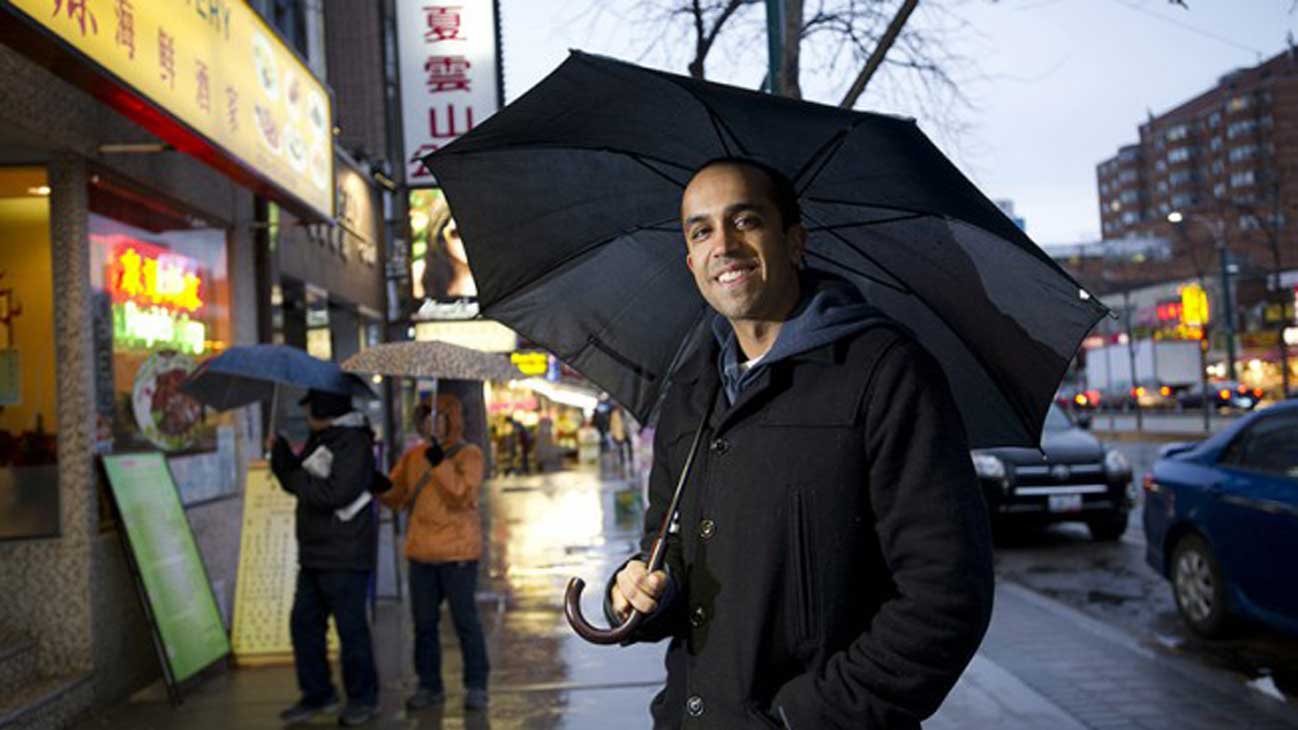In 2010, Neil Pasricha became an overnight sensation when his blog 1000 Awesome Things became the international bestseller The Book of Awesome. Since then the Toronto-based former Wal-Mart executive has become the poster boy for positive thinking. His latest book, The Happiness Equation, examines how to turn life’s little slices of awesome into sustained contentment. Here, he shares some of the secrets to his success, including why it’s easier to take on life’s big questions in a uniform:
Happy is the goal, not the byproduct
My parents are immigrants – my mom’s from Africa, my dad’s from India. When I was a kid they said to me: Work hard, then you’ll have big success, then be happy. It’s the model so many of us were brought up with – that these accomplishments are going to make us happy, but truth is that if you’re happy at the onset, your productivity goes up, your creativity goes up. We want to be successful, but we don’t get happy from success. So we need to be happy, then do great work and have great success. I learned this with the big success of my first book. It was on bestseller lists and I thought that would make me happy. But then I wanted it to be No. 1 and then I wanted it to stay there for a hundred weeks. The things that really make us happy are behaviours like taking walks, meditating, journaling, random acts of kindness. I really do believe that we’re on the brink of a happiness revolution.
Forever in blue jeans (and black blazer)
If you see me giving a talk, I’m probably wearing a black blazer, white shirt, blue jeans. Wearing the same thing is a habit I have taken up. Mark Zuckerberg and Barack Obama do the same thing, and the idea is that by eliminating the hundreds of tiny decisions each of us make every day – what route to take to work, what to have for lunch, who to have lunch with, whether to go to the gym – we reserve decision-making energy, which is finite in a given day until we get either more glucose or more sleep. I want to use this energy for the choices that matter: Where do you want to live? Who do you want to live with? What do you want to do? We don’t wrestle with these questions enough because we waste so much fuel on the small and inconsequential. We spend time deciding what to have for lunch every day instead of deciding if should we stay at that job.
To open your schedule, lock up your e-mail
We all want more time, but in some ways we have too much of it. Parkinson’s law is that work rises to fill the time available for its completion. The example I share in the book is about a technology executive who ignores the standard six-month website development cycle and instead books secret offsites for his entire 60-person team for a full day. Nobody knows in advance and in the morning he says: Today we’re going to build an entire website. Everyone we need to do it is in this room and we’re not going home until it’s done. And they get it done. In my own life, one of the habits I have developed is to respond to e-mail in one hour – once a day, from 4 to 5. Anyone who writes to me in the morning – they’ll get a response, it’s still the same day. And for anyone who e-mails me later in the day, they aren’t expecting a response until the next day. By eliminating the time I have for e-mail, e-mail takes less time. Of course it’s easier said than done – you have to have a system in place. I have my wife change my password and she won’t give it to me until 4 p.m.
The permutations of a happy family
I’m still pretty new at this dad thing, so I’m kind of figuring it out as I go along. But one of the things that’s working for me so far is to think about spending time with my family – my wife and my two sons – in terms of permutations. Every week I try to spend some quality time with each permutation – time for just my wife and myself together, time with all four of us, some time with each of my sons individually and then with the boys together. It’s a good way of making sure you are not falling into patterns and maybe not spending enough time on one relationship. And of course one of the permutations is just me alone. That can be hard with two young kids, but I try to make the time.

